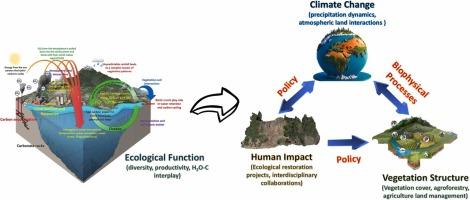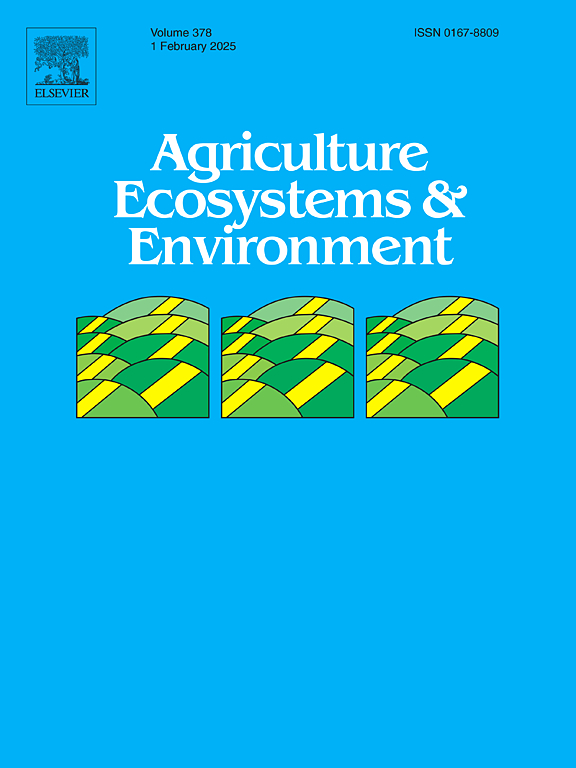The role of agricultural land management in modulating water-carbon interplay within dryland ecological systems
IF 6
1区 农林科学
Q1 AGRICULTURE, MULTIDISCIPLINARY
引用次数: 0
Abstract
Balancing limited water resources with agricultural demands is a major challenge for global sustainability, particularly in dryland regions. To address this issue, it is crucial to understand how human activities, particularly agricultural practices, affect the balance between water availability and carbon cycling. This review examines the impact of land-use intensity on hydrological and carbon cycles in dryland ecosystems, emphasizing the need for sustainable agricultural practices to prevent soil degradation, erosion, and biodiversity loss. It also explores the water-energy nexus in dryland agriculture, highlighting the importance of integrating sustainable water management with renewable energy technologies to reduce carbon emissions and conserve water. Evidence from field studies, remote sensing, and modeling approaches is reviewed to show how different management strategies can either mitigate or exacerbate stresses on water-carbon dynamics. The effects of these interactions on soil health, plant productivity, and atmospheric carbon concentrations are critically evaluated, focusing on adaptive management strategies to enhance resilience and sustainability. Strategies such as implementing drought-resistant crops, conservation agriculture, and agroforestry are highlighted as essential methods to increase water efficiency and carbon storage. Furthermore, this review discusses the importance of incorporating socioeconomic and policy perspectives to promote practices that align with ecological conservation goals. It identifies knowledge gaps and proposes a multidisciplinary research agenda aimed at optimizing land management in drylands to achieve both agricultural viability and ecological balance in the face of climate change. Understanding the complex relationship between agricultural practices and ecosystem functions is crucial for developing sustainable land management strategies that mitigate environmental degradation and ensure food security.

农田管理在旱地生态系统中调节水-碳相互作用的作用
平衡有限的水资源和农业需求是全球可持续发展面临的一大挑战,尤其是在干旱地区。要解决这个问题,关键是要了解人类活动,尤其是农业实践,是如何影响水供应与碳循环之间的平衡的。本综述探讨了土地利用强度对旱地生态系统水文和碳循环的影响,强调了可持续农业实践对防止土壤退化、侵蚀和生物多样性丧失的必要性。报告还探讨了旱地农业中水与能源的关系,强调了将可持续水资源管理与可再生能源技术相结合以减少碳排放和节约用水的重要性。报告回顾了来自实地研究、遥感和建模方法的证据,以说明不同的管理策略如何减轻或加剧水-碳动态的压力。文章对这些相互作用对土壤健康、植物生产力和大气碳浓度的影响进行了批判性评估,重点关注提高恢复力和可持续性的适应性管理策略。本综述强调,实施抗旱作物、保护性农业和农林业等策略是提高用水效率和碳储存的重要方法。此外,本综述还讨论了纳入社会经济和政策视角以推广符合生态保护目标的实践的重要性。综述指出了知识差距,并提出了多学科研究议程,旨在优化旱地土地管理,在气候变化面前实现农业可行性和生态平衡。了解农业实践与生态系统功能之间的复杂关系,对于制定可持续的土地管理战略、缓解环境退化和确保粮食安全至关重要。
本文章由计算机程序翻译,如有差异,请以英文原文为准。
求助全文
约1分钟内获得全文
求助全文
来源期刊

Agriculture, Ecosystems & Environment
环境科学-环境科学
CiteScore
11.70
自引率
9.10%
发文量
392
审稿时长
26 days
期刊介绍:
Agriculture, Ecosystems and Environment publishes scientific articles dealing with the interface between agroecosystems and the natural environment, specifically how agriculture influences the environment and how changes in that environment impact agroecosystems. Preference is given to papers from experimental and observational research at the field, system or landscape level, from studies that enhance our understanding of processes using data-based biophysical modelling, and papers that bridge scientific disciplines and integrate knowledge. All papers should be placed in an international or wide comparative context.
 求助内容:
求助内容: 应助结果提醒方式:
应助结果提醒方式:


